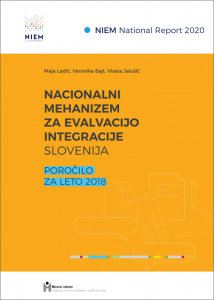
Second National Report on Slovenia on the implementation of integration policy towards beneficiaries of international protection
The second National Report on Slovenia on the implementation of integration policy towards beneficiaries of international protection was implemented in 2019 and consisted of 186 indicators aimed at diagnosing of the existing situation in Slovenia. It follows the time period between 1st January 2018 and 31st December 2018 with some updates from 2019 as well.
Rather than describing in detail all the various areas of integration policy towards refugees in Slovenia, the report aims to highlight three selected fields that most significantly affect the life trajectories and living situations of persons with international protection, but also migrant men and women more generally: a) accommodation/housing, b) recognition of education and possibilities for further schooling and vocational training, and c) employment.
Three main challenges identified in the area of access to housing:
- Integration houses’ capacity is not sufficient
- Many beneficiaries of international protection are facing financial problems
- Discrimination and racism negatively affect access to housing.
Three main challenges identified in the area of education:
- Lack of requested documentation to prove their already accomplished level of education or training
- Language barrier is a big challenge since education in Slovenia is at all levels in Slovenian, even at tertiary level, with only a few exceptions.
- There is no adequate Slovenian language course for illiterate persons.
Four main challenges identified in the area of access to employment:
- The requirement for Slovenian language proficiency
- Recognition of skills and qualifications
- Reluctance to employ refugees
- Low salaries
